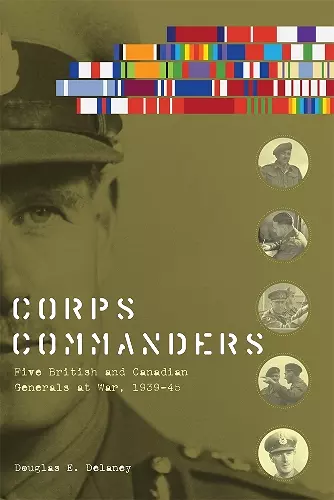Corps Commanders
Five British and Canadian Generals at War, 1939-45
Format:Hardback
Publisher:University of British Columbia Press
Published:15th Apr '11
Currently unavailable, and unfortunately no date known when it will be back

An eloquent historical analysis that provides the most cogent picture to date of command and leadership at the corps level.
Corps Commanders explains how five very different Second World War British and Canadian generals fought their battles, and why they fought them in similar fashion.
The five British and Canadian generals depicted in Corps Commanders were a surprisingly eclectic lot – one a consummate actor, one a quiet gentleman, one a master bureaucrat, one a brainy sort with little will, and the last a brain with will to spare. And yet they all fit readily into British Commonwealth armies and fought their corps in similar fashion. All three Canadians controlled British formations and served under British army commanders, and the two Britons worked for and led Canadians as well. Such inter-army adjustments were relatively simple because they all spoke the same “language” – a common method for solving military problems and communicating solutions. Like all senior commanders in the British Commonwealth, they learned the language of the staff colleges at Camberley and Quetta, and so did the staff officers that served them. This allowed a gunner from Montreal to understand a guardsman from London with ease – no small advantage when coordinating coalition battles involving tens of thousands of troops.
In probing how these corps commanders fought, Douglas E. Delaney has produced an invaluable study for anyone interested in coalition warfare, interoperability, or how men managed large formations in war.
Delaney's book offers a relevant prompting of the importance of rigorous study of intelligence, thorough pre-operational training and comprehensive equipment and logistic support for any new campaign or operational initiative. -- Michael Tillotson * The Times of London *
Delaney has done an incredible amount of research, mining eleven major archives in three countries along with a number of private collections. This addition to the University of British Columbia Press and Canadian War Museum’s 'Studies in Canadian Military History' series is an exemplification of strong scholarly work that is breaking new ground in the field of military history. http://www.canadianmilitaryhistory.ca/review-of-douglas-e-delaneys-corps-commanders%E2%80%AF-five-british-and-canadian-generals-at-war-1939-45-by-william-pratt/ -- William Pratt * Canadian Military History Journal *
Meticulously researched ... Corps Commanders is an important addition to the body of knowledge on the Second World War and the study of command. The many lessons on leadership and command that emerge are timeless and are as relevant today as they were then ... this is an outstanding book that should be read by all aspiring leaders and commanders, and as early in their careers as possible. It is also strongly recommended for all military members of any rank, as well as for historians and anyone who is interested in the profession of arms.
The great strength of Delaney's work is that it is not broad brush, but rather delves into the intricacies of this highest level of tactical command. This is military history at its best – and in stressing that all five commanders passed through the imperial staff colleges of Camberley or Quetta in India, Delaney also reminds readers that Canadians fought the war as British subjects who never expected their empire to fall. -- John A. English * Journal of Military History *
This is a brilliant book. Dr. Doug Delaney…has written an incredibly valuable book that delivers on several levels. -- Colonel Bernd Horn * Canadian Miltiary History Journal, Vol 12, No 1 *
The great strength of Delaney's work is that it is not broad brush, but rather delves into the intricacies of this highest level of tactical command. This is military history at its best – and in stressing that all five commanders passed through the imperial staff colleges of Camberley or Quetta in India, Delaney also reminds readers that Canadians fought the war as British subjects who never expected their empire to fall.
-- John A. English * Journal of Military History *- Commended for C.P. Stacey Award for scholarly work in Canadian Military History 2011 (Canada)
ISBN: 9780774820899
Dimensions: unknown
Weight: 740g
408 pages